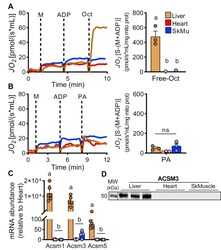Antibody data
- Antibody Data
- Antigen structure
- References [1]
- Comments [0]
- Validations
- Other assay [1]
Submit
Validation data
Reference
Comment
Report error
- Product number
- PA5-100374 - Provider product page

- Provider
- Invitrogen Antibodies
- Product name
- ACSM3 Polyclonal Antibody
- Antibody type
- Polyclonal
- Antigen
- Synthetic peptide
- Description
- Antibody detects endogenous levels of total ACSM3.
- Reactivity
- Human, Mouse, Rat
- Host
- Rabbit
- Isotype
- IgG
- Vial size
- 100 μL
- Concentration
- 1 mg/mL
- Storage
- -20°C
Submitted references Octanoate is differentially metabolized in liver and muscle and fails to rescue cardiomyopathy in CPT2 deficiency.
Pereyra AS, Harris KL, Soepriatna AH, Waterbury QA, Bharathi SS, Zhang Y, Fisher-Wellman KH, Goergen CJ, Goetzman ES, Ellis JM
Journal of lipid research 2021;62:100069
Journal of lipid research 2021;62:100069
No comments: Submit comment
Supportive validation
- Submitted by
- Invitrogen Antibodies (provider)
- Main image

- Experimental details
- Fig. 5 Differential octanoate oxidation between liver, heart, and skeletal muscle. A, B: Rates of oxygen consumption in isolated mitochondria of liver, heart, and skeletal muscle as representative traces over time and quantification of maximum rates during administration of malate (M) and ADP along with free octanoate (Oct) or free palmitate (PA) as substrate, n = 3. Relative abundance of ACSM isoforms by (C) mRNA and (D) expression of ACSM3 protein in liver, heart, and skeletal muscle, n = 3-6. Data are presented as mean +- SEM, all from male mice. Statistical analysis by 1-way ANOVA. Means depicting a different letter indicate significant differences between groups ( P
 Explore
Explore Validate
Validate Learn
Learn Western blot
Western blot Other assay
Other assay